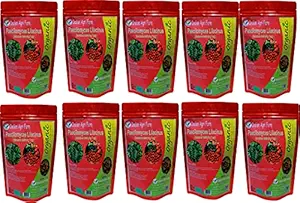Fungicides By IAgriFarm
by IAgriFarm
Price:  299
299
 900
900
 299
299
 900
900
You Save:  -40%
-40%
 -40%
-40%
by IAgriFarm
Price:  379
379
 0
0
 379
379
 0
0
You Save:  -24%
-24%
 -24%
-24%
by IAgriFarm
Price:  1499
1499
 0
0
 1499
1499
 0
0
You Save:  -40%
-40%
 -40%
-40%
IAgriFarm Pseudomonas Fluorescens with (2x10^8 CFU/g) | Bio-Fungicide Powder Pack of 500 Grms Pack of 1 - Product Features
- It protect crops from a number of soil borne / seed borne plant pathogens
- It helps in controlling pathogenic nematodes present in soil
- Phosphobacteria is mainly used for direct soil application. It can be used for seed treatment also. Apply in wet soil as basal dose along with organic manure and refresh it periodically along with organic manure.
- The normal dosage of Phosphobacteria is 20 g/plant.
- This bacterium enters the plant system and act as a systemic bio control agent against diseases. It effectively protects the plant from wilt, root rot, soft rot, blight and damping off effect
IAgriFarm Trichoderma Viride with 1.5% W.P.: 2 x 10 * 6-10 * 8 CFU/gm | Bio-Fungicide Powder Pack of 500 Grams - Product Features
- Trichodemm viride is a naturally-occurring beneficial soil fungus that protects crops from several diseases caused by seed-bome and soil-bome fungal pathogens like Rhizoctonia spp.. Pythium spp.. Fusarium spp.. Altemaria spp. etc
- It is used as an effective seed dressing and soil treatment product to combat seed and soil borne fungal diseases.
- It colonizes maximum space and absorbs maximum nutrients available at the target site and thereby controls the pathogens by starving them for food and space.
- It produces antibiotics and toxic substances like Glyotoxin. Viridin and Trichodermin which kills the fungal pathogens.
- It decomposes raw organic farm wastes, solubilizes soil phosphorus, reclaims adverse soils, promotes plant growth and protects soil eco-system.
IAgriFarm Paecilomyces Lilacinus with 1.0% W.P | Bio Fungicide for Control of Nematode Pack of 500 Grms Pack of 10 - Product Features
- Its an Nematode destroying fungi have long been considered as promising bio control agents. Among these, Paecilomyces lilacinus is an effective parasite of nematode eggs.
- It is a talc based formulation of nematophagous fungus, Paecilomyces lilacinus, that is capable of parasitizing nematode eggs, juveniles and females, and thus reduces the plant parasitic nematode population in the soil.
- Egg parasites are more effective in reducing the populations. It also infects juveniles and young adults of most nematode species. It is highly useful in vegetables, pulses, oil seeds, turmeric, banana, citrus, fruit crops and ornamental plants.
- Nematodes feed damage the plant roots and reduce the water and nutrient uptake which results in reduction in yield. In addition, the infested plant becomes more vulnerable to other stress factors such as heat, water shortage, nutritional deficiencies and disease causing organisms. It is difficult to control these nematodes with common chemical pesticides.
- Target Pests: Root knot nematodes, False root knot nematodes, Burrowing nematodes, cyst nematodes, Root lesion nematodes
To ensure that as many farmers as possible are able to access the benefits, the Kisan Store has five Indian languages including Hindi, Telugu, Kannada, Tamil, and Malayalam. Farmers who prefer to shop offline at a neighbourhood store can also benefit from the range of choice and conveniences of Amazon’s Kisan Store. They can visit any one of the 50,000+ Amazon Easy stores across the country where the store owner will help them browse the selection, identify a product, create an Amazon account and place orders. Farmers can choose from a selection of thousands of farming equipments from over 20+ brands. This selection is offered by hundreds of Small and Medium Businesses present across the country.
Inaugurating the store, Shri Narendra Singh Tomar, Hon'ble Minister of Agriculture & Farmers Welfare, said, Addressing at the launch event, Shri Narendra Singh Tomar, Hon'ble Minister of Agriculture & Farmers Welfare said, “It gives me immense pleasure to launch Amazon Kisan Store. I hope this initiative proves to be beneficial for the farmers and the people associated with the farming community to engage the Indian farmers in the modern era of digital economy, increase the productivity of agricultural produce, provide services like logistics industry.
Many D2C brands across the country have surpassed the Rs100-crore benchmark in revenue. According to the Shiprocket-CII-Praxis report, grocery, gourmet, apparel and footwear and personal care are the largest D2C categories, together capturing more than 75% of the D2C market
Shiprocket, India's largest eCommerce enablement platform, has released a report on the D2C market in India in partnership with CII (Confederation of Indian Industries) and Praxis Global Alliance, a global management consulting and consulting firm.
According to the report, Direct to Customer (D2C) is a $12 billion market and is witnessing remarkable and rapid growth. The report states that several D2C brands in India have surpassed Rs 100Cr revenue in 3-5 years after launch.
The latest report shows that D2C brands represent an estimated $60 billion industry in FY27, at a CAGR of approximately 40%. The numbers in the report are staggering and pave the way for a new model of e-commerce in which brands choose to own and operate their own sales counters on the Internet. This remarkable trend has been reaffirmed by the fact that many D2C brands across the country have surpassed the INR 100-crore benchmark in revenue. Moreover, this revenue benchmark was only reached in 3-5 years since the start of the activities.
These trends are supported by the brands' agility and Go-To-Market (GTM) strategy, as well as strong digital capabilities that have helped their businesses grow and gain a competitive advantage. The report shows that branded packaging has also been a key factor in attracting buyers. The average order value (AOV) of each product and a hefty gain in gross margins are the fundamental headwinds driving this trend further.
Speaking about the report's launch, Saahil Goel, co-founder and CEO of Shiprocket said: "The rise of online-first shopping and conscious consumerism have fueled the era of direct-to-consumer (D2C) brands limited to marketing alone. of their products through online marketplaces or offline channels, quite a few brands are developing their own eCommerce stores or apps for the purpose of capturing orders and delivering them directly to the customers using eCommerce enablers. direct selling, this trend is continuing to newer heights.The rationale for direct selling is the same online as offline.Brands create their own branded stores and also sell in department stores or multi-brand outlets if they can control the brand experience in their own stores. Likewise, direct-to-consumer online channels empower brands to control the story and brand experience."
He added: "With this report, our aim is to provide the first-ever comprehensive deep dive of the D2C sector in India and its huge potential in the coming years."
Commenting on the launch, Praxis Global Alliance partner Mohit Mittal said: "The Indian e-commerce market is growing rapidly (estimated CAGR of 25% from FY22 to FY27). We have seen that almost all PINs in India use e-mail. commerce.Many of these transactions and orders come from second and smaller cities.By FY30, India will also have 1.3 billion+ smartphone users and 500 million+ online shoppers.The growing e-commerce sector is positively impacting D2C growth brands in India.With more people shopping online and more money being spent by consumers, the market is likely to expand in the next five years.To reduce their reliance on the marketplaces, even traditional brands are increasingly developing their direct-to-customer channels, such as tools for websites, apps and social media to reach and sell their customers."
To estimate the size of the D2C market in India, we considered seven categories: Personal Care, Apparel & Footwear, Groceries & Refined Foods, Jewelry, Electronics, Healthcare, Home Furnishings, Garden & Outdoor. Existing players (such as Unilever, Marico, Tata Consumer Products and ITC) are either acquiring prominent D2C brands or going the organic route to launch their own brands online and build their own D2C platforms. But for D2C brands to sustain this growth, they must amplify product innovation and renew manufacturing and sourcing strategies to become industry leaders. So to win the market, it is also essential to improve offline distribution, customer acquisition and unit economy.
Popular Categories on BuyBestBrands.in
Garden & Outdoors : Seeds, Plants, Plant Containers, Gardening Tools, Garden Decor, Pest Control, Barbecue & Outdoor Dining, Solar Power, Fertilizer & soil, Watering Equipment
Amazon Brand : Symbol, Inkast Denim Co, House & Shields, Jam & Honey, Solimo, Presto!, Symactive, Eden & Ivy, Vedaka, Tavasya, Myx







